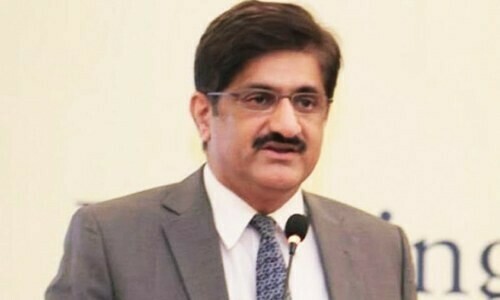Murad Ali Shah, the chief minister of Sindh, stated on Friday that neither the federal government nor the International Monetary Fund (IMF) had expressed concerns regarding the NFC Award.
The NFC Award is the allocation of revenues between the federation and the provinces “through an Order (the NFC Award), on the recommendation of the National Finance Commission,” as stated in Article 160 of the Constitution.
After the World Bank’s Pakistan Development Update (PDU) report for October was released, the chief minister told the media that while the Sindh government had concerns about some issues, he was working with the federal government to find solutions. He also said that “the PPP would only support measures that are in the interest of the country.”
The chief minister had stated in October that the Sindh government had agreed to the National Fiscal Pact in order to fulfill the IMF’s requirements for completing Pakistan’s $7 billion Extended Fund Facility.
The IMF has stipulated that one of its key conditions for serving as a structural benchmark in addressing the disparity between federal and provincial revenues and expenditures is the approval of a National Fiscal Pact.
The Sindh Chief Minister also confirmed that Finance Minister Muhammad Aurangzeb had assured him that the Sindh government’s concerns regarding particular NFP provisions would be addressed.
The chief minister stated that the provincial government had written to the federal government its reservations regarding certain pact conditions regarding the proposed abolition of agriculture support prices and equal agriculture income tax in the four provinces covered by the NFP.
When asked about the federal government’s decision to prematurely terminate contracts with five independent power producers (IPPs) today, Murad said that he had read about the news in the media and suggested that the government use excess electricity.
He suggested that the industrial units could get free electricity if they started more night shifts to increase their production capacity.
He stated, “This would help offset the capacity charges paid by the federal government to the IPPs, improve production, and create job opportunities for workers who are unemployed.”
Shah mentioned that the federal government had begun devolving or winding down some of its ministries in order to begin implementing the 18th Amendment.
The chief minister said, “Sindh govt committed to overcoming challenges” at the launch of The World Bank’s South Asia Development Update (SADU) and Pakistan Development Update (PDU) for 2024. He praised the reports for providing a roadmap for sustained growth and said that the reports provide crucial insights into the economic challenges Pakistan and the South Asian region face.
The chief minister stated that his government remained committed to overcoming these obstacles, and the people of Sindh have shown their confidence in the government to serve and uplift them. The devastating floods of 2022, which submerged nearly 70% of Sindh, caused extensive infrastructure damage, compounding the developmental issues.
Shah said that his government responded to the report’s findings, which highlighted rising poverty in 2023, regarding poverty alleviation.
He added, “The Sindh government has taken several steps to support the most vulnerable segments of society,” and noted that one of the most important government initiatives was the Emergency Housing Reconstruction Project, which was designed to provide housing for over two million people whose homes were destroyed by the floods in 2022.
He stated, “It is anticipated that this project, with a focus on climate resilience, will drive socio-economic changes in rural areas.”
“The Sindh government, in cooperation with federal agencies, has ramped up efforts to curb electricity theft and improve recovery operations,” CM Murad said, citing the World Bank report that reveals the country’s circular debt in the power sector.
The chief minister stated that the provincial government was actively addressing the poor’s inability to obtain formal financial loans.
He said, “The People’s Poverty Reduction Programme — a flagship initiative — is offering poor entrepreneurs loans with zero interest.” He added that plans were in the works to expand these efforts with help from international partners like the International Fund for Agriculture Development (IFAD) and the European Union, and that these programs were meant to help small and medium-sized businesses (SMEs).
Shah reassured the attendees of the government’s fiscal discipline, despite the report’s concerns about rising public sector borrowing.
He argued that “while domestic borrowing has been authorized, the province has largely avoided it — instead boosting revenue through tax reforms.” Additionally, he stated that the government’s borrowing had primarily come from international development partners at favorable rates, and that it was intended to restore flood-affected areas.



